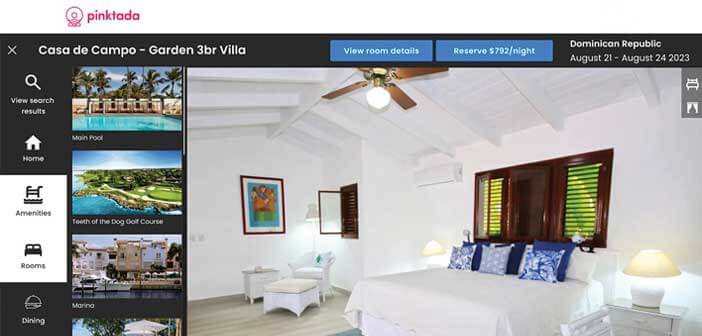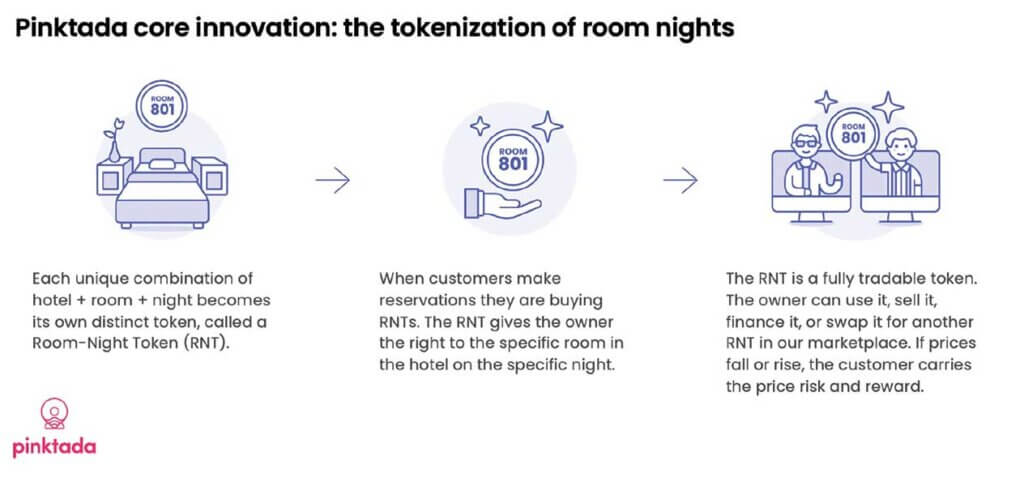Ticket resale companies like Stubhub, SeatGeek and TickPick have changed the way people buy tickets to concerts and sporting events. Now, technology company Pinktada wants to change to the way people buy hotel rooms.
“The process in which reservations are made really hasn’t evolved since the beginning of the hotel industry,” said Mark Gordon, chief hospitality officer, Pinktada. “Today, there are really only two forms of reservations—a refundable reservation and a nonrefundable reservation. Hotels generally prefer to have a percentage of their reservations on a nonrefundable basis, because that provides them with guaranteed revenue to offset high and rising fixed costs. Because of the pandemic and current economic conditions, most hotels have lost their ability to sell non-refundable reservations, and they’re desperately looking for a new way to reintroduce nonrefundable.”
Gordon and the team at Pinktada have introduced a new concept that they say allows travelers the economic benefit of booking a non-refundable reservation, but with the flexibility of a refundable reservation—all while offering the hotel a benefit.
It works through a tokenization process, with each room night becoming its own distinct virtual token. Each token is coded with the hotel name, the specific date of the reservation and the rate paid by the guest each night.
“The guest pays for those tokens at the time of booking,” he said. “The hotel gets paid for that reservation at the time of booking, irrespective of the actual travel date.”
But, if the traveler’s plans change, they can swap or sell all or part of their stay. “This kind of flexibility has never existed before in the travel industry and really will be the conduit to help hotels and resorts restore the nonrefundable reservation in a way that benefits both the hotel and the traveler,” said Gordon.
To use the system, a traveler must sign up for a free membership to Pinktada. “We don’t charge for membership, but we want to know who our customers are,” he said.
On the Pinktada website, the guest searches for hotels in the same way they would on an OTA, by including the location and dates of stay. The hotels set the initial rate for each night of the stay. “Each token has a specific rate that equates to the rate the hotel is charging Pinktada for the room for that night,” said Gordon.
If a member decides to resell one of their room nights and it is for a profit, 30% of the profit goes back to the hotel. “The hotel shares in the secondary sale,” he said. “If our member sells their night for a loss, the hotel is not impacted because once those initial tokens are sold, the hotel can never lose. It can only win on a resale.”
3D virtual tours
In addition to offering the hotel reservations on its site, Pinktada also has a tool for potential guests to explore the properties and their offerings that Gordon helped create. After developing a variety of hotels in New York City, he realized the industry was missing something in the marketing of guest stays at a property.

The Knickerbocker hotel in New York City is one of the properties on Pinktada’s tokenization platform.
“I realized the industry really didn’t have a lot of tools for showcasing what made each of these hotels unique to prospective travelers prior to their booking,” he said. “It highlighted to me the shortcomings of the current way that hotels market themselves, particularly the OTAs, which have a very formulaic way of marketing, where pretty much every hotel looks the same.”
The decision to book, particularly for leisure travel, becomes based on price, because “consumers don’t really have great tools that allow them to understand what makes each hotel or resort unique,” he added.
To help guests get a better sense of the hotel they are booking, Pinktada created a program that allows for them to take a 3D tour of the property. “When a hotel partners with us, we have an onboarding team that goes to the property and we oversee all of the 3D photography, the curation of that process, the data integration and the setup onto our site. That’s all done at our cost,” he said.
He added, “Guests can actually explore what makes each hotel or resort unique. They could walk the lobby and the restaurant and bars. They can imagine themselves in the pool, they can see the golf course and see the spa treatment rooms. It really allows the traveler to develop an emotional connection with the hotel or resort.”
The system allows the guest to book a room directly through the 3D window. “Our core innovation is not the 3D photography itself,” he said. “Anyone can do that. But the ability of taking the 3D photography and turning it into a navigable tool is really what we spent the last two years and millions of dollars developing.”
Gordon also said the system helps to sell room upgrades. “Most travelers start with the cheapest room when booking a vacation,” he said. “They look at that standard double queen and they try to envision themselves with their families squeezing into it. We’ve all been there and done that.”
After the guest has toured that standard room, the system invites them to consider a deluxe room. “They can then quantify why they should spend more for a higher room class,” he said. “What we are finding is that if guests can actually understand why they should pay more, they’re more likely to do so.”




